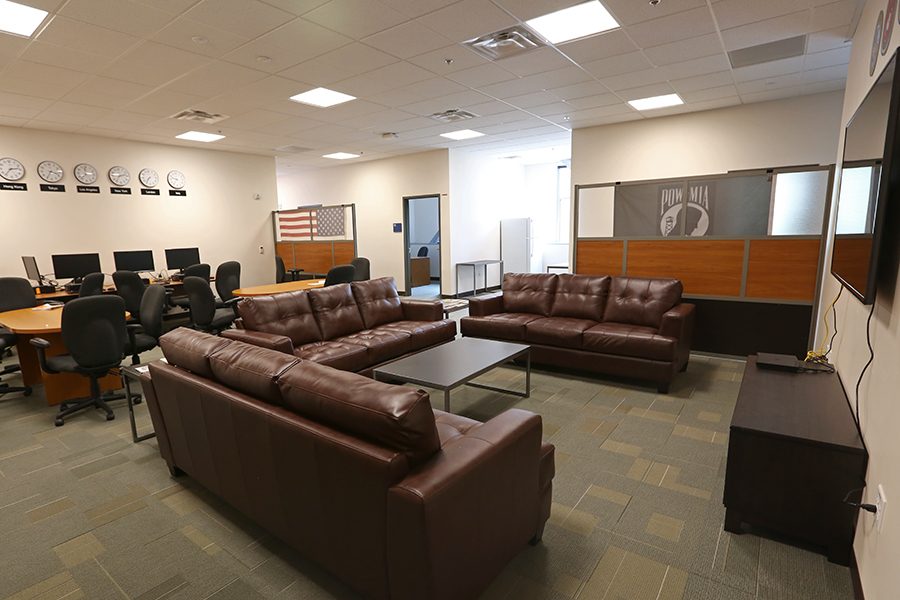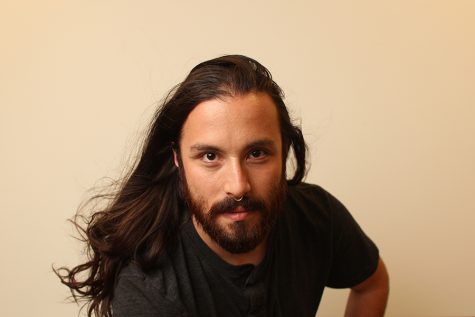Funds give veteran population more space
Furnished, larger room provides a modern replacement for the ‘veteran’s corner’
The Veteran Resource Center was relocated to the Student and Administration Building on Aug. 30. The center, in SA-101, includes $50,000 of furnishings donated by the Sentinels of Freedom group.
Sep 16, 2016
Veterans have more than a corner to access resource and assistance with the Veteran Students Resource Center (VSRC) relocating to SA-101 as of Aug. 30, within the Student Life Office.
Contra Costa College’s “Veterans Corner,” which was located in the Student Services Center, originally provided services to student veterans.
The VSRC is currently open from 10 a.m. to 4 p.m. Monday through Friday and accepts any veterans with needs. A grand opening is scheduled for Nov. 10 in the pavilion in front of the Student and Administration Building.
“We thought it would be festive to combine the three events of the Marine Corps birthday on the 10th (of November), Veterans Day on the 11th and the grand opening of the center,” VSRC volunteer Dedan Ji Jaga said.
Admissions and Records assistant Trinidad Ledesma said the center has been furnished, using $50,000 that was donated by Sentinels of Freedom, a veteran non-profit scholarship organization. with an all-in-one printer, leather couches, smart television, a refrigerator for food storage between classes and open tables for veteran students use.
Four desktop computers also have been set up for veteran students to use, he said.
According to The Advocate’s Sept. 2, 2015 issue, Sentinels of Freedom donated $150,000 to the Contra Costa Community College District, $50,000 to each of its three colleges to furnish veteran centers while establishing certain criteria that the student veterans and college administration must adhere to in order to receive the financial assistance.
The process began when Diablo Valley College veteran Brad Vargas reached out to Sentinels of Freedom last spring for assistance in acquiring a designated space where students could receive academic and counseling specific to veterans, DVC student and Marine Corps veteran Ryan Kellei said.
Ledesma said, “The way the $50,000 works is to get the space up and running.
“If the space was larger and there were two lounge areas, they would furnish it up to the $50,000. But if the space was smaller they wouldn’t gold leaf everything.
“If there is something down the line that student veterans need (that surpasses) $50,000, a request could be made to the administration who would forward reasonable requests to Sentinels of Freedom to ask for assistance in acquiring it,” he said.
The Armed Forces Service and Support Group student club President Leon Watkins said, “I’m trying to give Sentinels of Freedom as much respect as possible with this because not everyone can drop fifty grand.”
One of the Sentinels of Freedom’s stipulations for the donation was student veterans at each of the campuses in the district must maintain an active veterans club that is maintained by a veteran student adviser and must participate in at least one community event a year, according to The Advocate’s Sept. 2, 2015 issue.
Watkins said the club has yet to have its first official meeting with members and is waiting for final certification.
Meanwhile, the group is working on finalizing the framework as far as positions of office, procedures and policies.
Ji Jaga said a rapid response team of designated faculty and staff members has been established in coalition with the VSRC in order to streamline veterans with needs from financial aid, tutoring, mentoring, or for veterans simply seeking advice or counseling by targeting specific representatives to address those needs.
“We are somewhat the intermediaries. (Veterans) hopefully confide in us in things that they might need that they aren’t comfortable talking to anyone else about and we will find out specifically who we need to connect them with,” he said.
“My goal here is to provide information, support and assistance to veterans who have questions about getting back into the academic arena and about their entitlements and hopefully becoming a mentor and peer adviser,” Ji Jaga said.
“My main thing is to make sure that I connect the veteran to the raw resource that he or she needs as opposed to another referral,” he said.
“It’s one of the most frustrating things that veterans have to deal with in the military.”
As well as volunteer staff members who will be available in the VSRC, Watkins has office hours at the VSRC to be available for veterans to communicate any needs or assistance.
“(The VSRC) is impressive. I think most veterans would walk through here.
Without the placement of the military insignias they probably wouldn’t think this is something for them.
“I’ve been to other campuses that have veteran lounges. Some are larger, but this to me is a state of the art deal, with the computers and the plush furniture,” Ji Jaga said.
Ledesma said changes are planned to move some furniture around in the center to maximize the space’s productivity, but the process is slow with any requests from the Armed Forces Service Support Group student club to the proper college administrators.
The process then requires communication with Buildings and Grounds and the IT Department to move computers and tables separately to the newly desired locations in the VSRC while still maintaining communication with the Sentinels of Freedom, he said.
“There’s a working hand-in-hand because the administration shouldn’t be making requests for things the students don’t want.
“We need to make requests (for changes) as it relates to education, the office or more computers,” Ledesma said.



